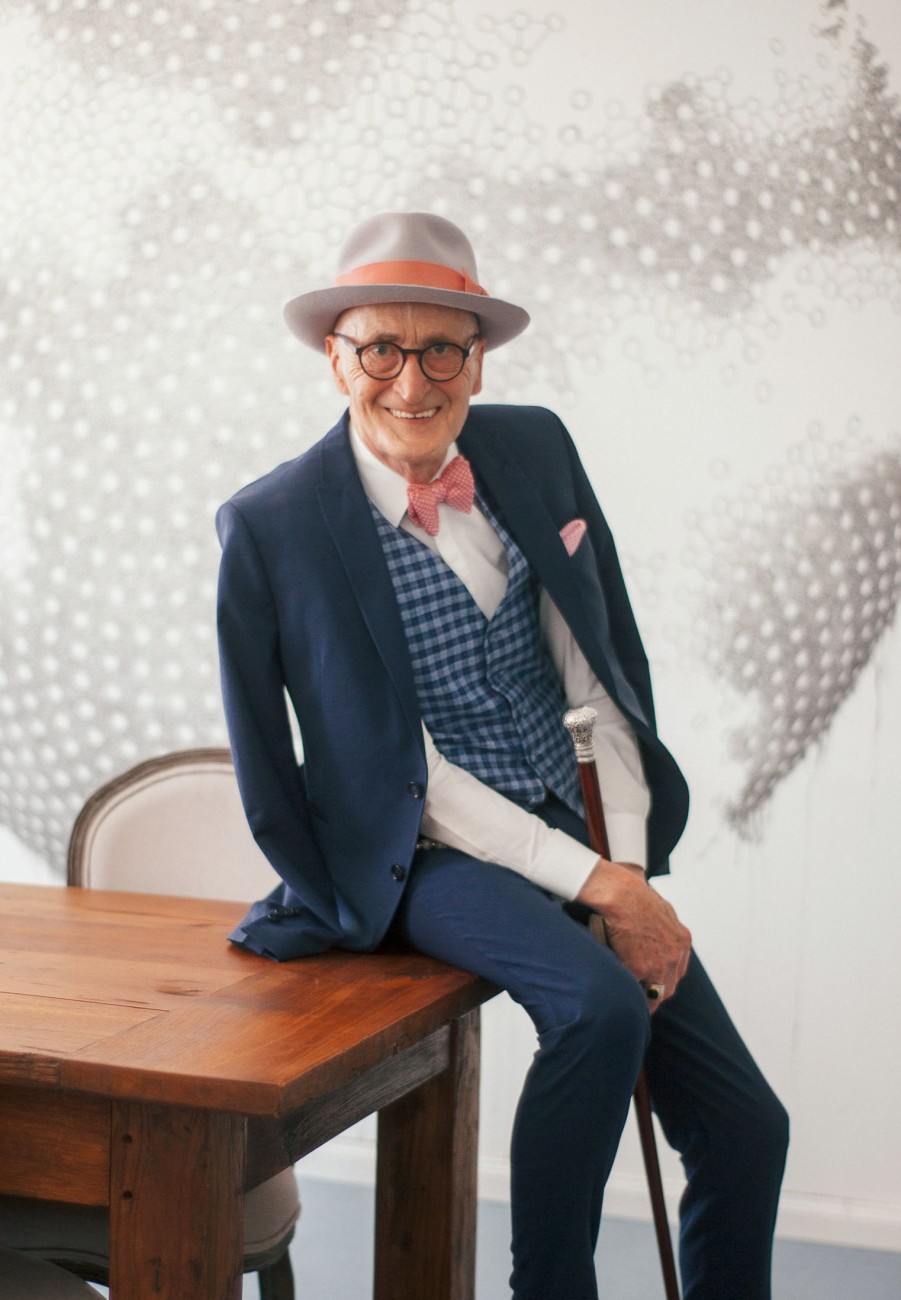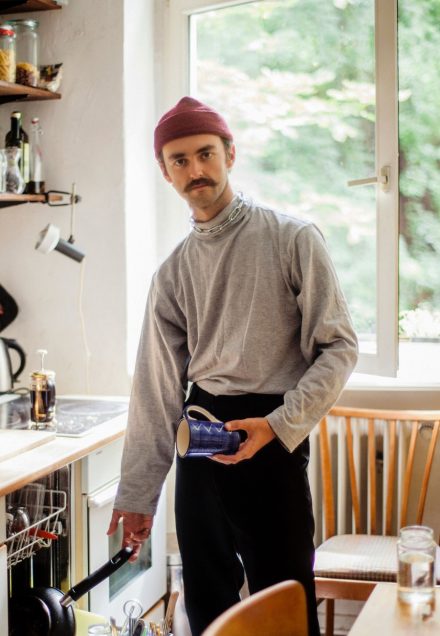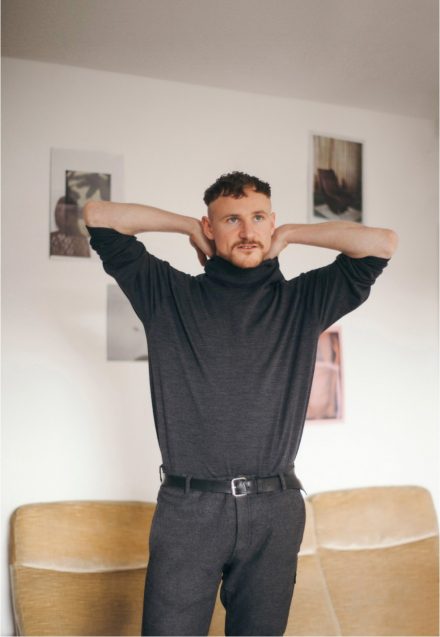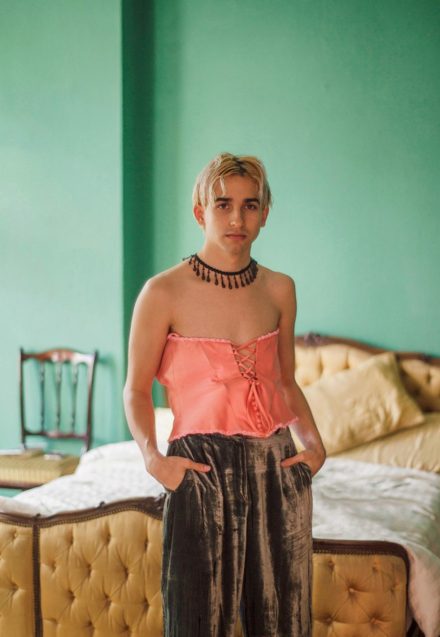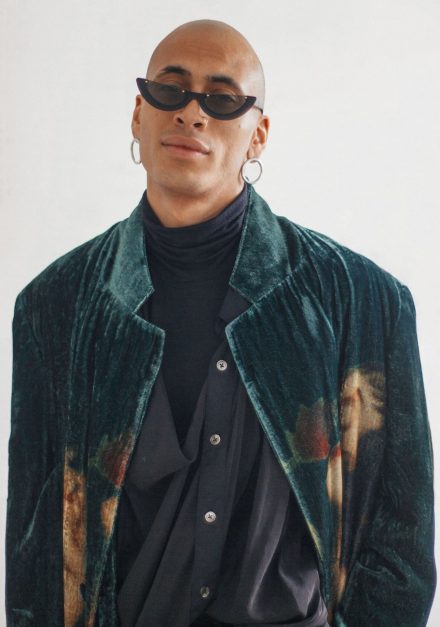By now it’s no secret that Guys on Clothes takes great pleasure in dissecting fashion’s florid myths and its male characters. So when we heard about Kreuzberg’s “oldest hipster” through the grapevine, we just knew we had to meet Günther Anton Krabbenhöft. Here’s what he had to say about ripped jeans and the evolution of personal style on Instagram v. the streets.

ΠMagazine: You have a very elaborate look. How long does it take you to put together an outfit, and what do you consider?
Günther: I get dressed pretty quickly. It probably takes me the amount of time of someone who’s choosing between a grey, a black or an off white t-shirt. I never know what I’m going to wear before wearing it, but I always have in mind what I wore the day before. Earlier in my life, I was a cook and had a uniform, but it didn’t affect my style. I would go to work dressed like this, and then change into more functional clothes on the spot.
Œ Magazine: What about after work? Did you ever leave the kitchen to go home wearing your white double-breasted cook’s jacket?
Günther: Oh dear, no!! I lived 15 minutes away from the restaurant I worked in and it was never a good enough reason to wear something out of pure comfort, you know? It’s the same now, when I go to the gym for example, I change before and after. If I was that lazy, I would look like most people I see on the streets.
Œ Magazine: What do “most people” look like?
Günther: They look like they wear “40-degree-laundry-clothes” to save time because they are soo busy they can’t iron a shirt or think about their looks on top of everything else. I think that’s just a bad excuse and I could never be that unkind to myself, you know? Of course, values and beliefs are worth more then appearances, but clothes are the outer shell that transports those values. They are the manifestation of a mood and a lot of people don’t get the importance of giving their mood a fitting frame.
ΠMagazine: What is the last thing you remember thinking when you looked in the mirror?
Günther: Shoot, one day older again! (laughs). Yesterday, I helped a neighbor get some deck chairs from the basement, and on that occasion I actually wore old working trousers and a t-shirt I keep for this sort of purpose. I looked in the mirror and thought, “Who’s that staring at me?!” When I’m in some store and catch a man trying on a beautifully tailored suit, standing in front of a mirror with an insecure posture, shaking his head, murmuring “this is not me”, I always think, “of course that’s you!” If only you embraced it and stood there differently, the whole package would probably look amazing and you would discover another side of yourself. So I tried to apply the same thought to myself the other day.

ΠMagazine: Did it work?
Günther: Yes and it was very amusing!
ΠMagazine: It is known that different types of clothing make us walk, talk, and act differently. Some of this has to do with the physical constrictions we experience while wearing them, sometimes our behavior changes as a reaction to an image they trigger in us or a projection. I think clothes are also an interesting testimony of how we deal with our body changing over the years. Did you ever feel the need of updating or changing your style based on your age?
Günther: It was more of a natural process. Generally speaking, I think classical men’s attire is a great solution when you start to get older. Don’t get me wrong, I’m not encouraging men to dress like English lords, although I’d prefer seeing that, over jersey pants on almost anyone. But it’s not very modern, unless you put your own twist on it. And if it’s only a detail…
Œ Magazine: What is a typical Günther detail?
Günther: The bowtie!
ΠMagazine: Which Kiez do you live in?
Günther: I’ve lived in Kreuzberg for 33 years now, and before that in Moabit.

Œ Magazine: Did Kreuzberg’s atmosphere influence your style at all?
Günther: Yes, especially when I first moved there. I made the anarchic Kreuzberg black my own. But it wasn’t a blind adaptation. I had this leather cap, an old “Spätheimkehrer” coat, skiing pants from the 20s that were way to wide and I would tie up somehow, and mountain boots. I shopped at second hand stores and looked like young Lenin (laughs). Regardless of the black theme in the background, I tried to keep it avant-garde! And it wasn’t long until I started breaking up the blackness with some colored detail, socks for example. Today it’s very common and you can find funky colored socks everywhere, but back then patterned socks were quite rare and I remember loving them. Same with the black look.
ΠMagazine: What do you think about the total black look today?
Günther: Most of the time total black looks so tired and lazy to me. Contrary to popular belief, only very few charismatic people will succeed at looking sophisticated and interesting in it. Ever since the end of the bridge airlift you can really wear whatever pleases you in Berlin, so I’m always a bit disappointed when people fail to endorse their looks with a personal touch. And if it’s only a red belt, you break it up with or a breast pocket kerchief.
Œ Magazine: Over the past thirty years, did you witness any changes in men’s personal style in Berlin?
Günther: It’s hard to look back without falling into the “everything was better once” cliché. Hmm, I feel like clothing has become broader in terms of what men’s fashion has to offer, but instead of taking advantage of the spectrum, most men are intimidated by it and blindly give in to trends. More than before. People don’t ask themselves, who am I? What do I want to be?

ΠMagazine: What do you think is keeping men from experimenting?
Günther: Heterosexuals are still scared of looking homosexual. Scared that someone in the group will drop “that” comment.
Œ Magazine: That’s it? Don’t you think Instagram has shown us that men of all kinds are more and more comfortable playing with their looks?
Günther: Things on the street are very different though. An Instagram photo is just a motionless frame of your life. It’s easier, to experiment and look good in the comfort zone of a picture you can take over and over again, without dealing with movement and how it might affect the way you are perceived.
Œ Magazine: As someone who’s not fond of trends, what is a trend you feel especially critical towards?
Günther: Ripped jeans. I think wearing something previously consumed or broken on purpose is really stupid. As I was mentioning before, I believe that, with a little effort, most people are capable of a decent outfit without having to copy or appropriate what less fortunate and homeless people wear out of necessity, to be hip. I find it quite disturbing. Especially knowing that destroyed jeans are being promoted by a society that denies this kind of issue in the first place instead of taking time to reflect it.
Œ Magazine: You’re right to point out that inconsistency. I think the ripped jeans statement might have been the result of deeper reflection of these issues during its first wave of popularity, within the metal and later grunge community, but that due to the major trend that reflection got lost in the wind. Although I’m sure that some people still wear destroyed jeans as a way of saying “these are still good enough and I don’t need to spend money on new ones to look good”.
Günther: Sure. But, let’s be honest, most of the time, jeans are destroyed so that it is clear to everyone, that they weren’t consumed while working. I’m always shocked to find 270 euro price tags on them, because “it is so much work to make authentic looking holes”. How ridiculous is that? Is that the group you want to belong to? I know you are probably thinking—Aw, this grandpa, but some things just don’t make sense!

Œ Magazine: I wouldn’t! Unfortunately, that’s one of many blind spots in the fashion industry. Do you consider yourself part of a scene?
Günther: Everyone is. No matter how outlandish your clothes are, you are part of a group, if only a tiny one. In fact, mine is so small you don’t see it on the streets.
ΠMagazine: What distinguishes your group? What do you share?
Günther: We are gentlemen. We are polite and our clothes, and the accuracy we put into our outfits are an expression of that.
ΠMagazine: What do you mean by polite?
Günther: When it comes to clothes I mean discreet. You are free to dress as you please, but that doesn’t make you less part of a society or community. So, when people completely fail to recognize what is appropriate, and what compliments them versus what doesn’t, when they walk around as if they were at the beach lacking self-awareness, I’m genuinely irritated. I can’t stress this enough, but it’s important to me, not only to be presentable, but to really do the best I can with my appearance. It’s almost cathartic for a good start into the day. Try wearing something that says “hey beautiful day, here I am!” and you’ll be surprised! Pleasing yourself and others with my sight is so simple and makes such a difference without it having to be a mission.

The Photographs were taken at cafe Osbili in Berlin
